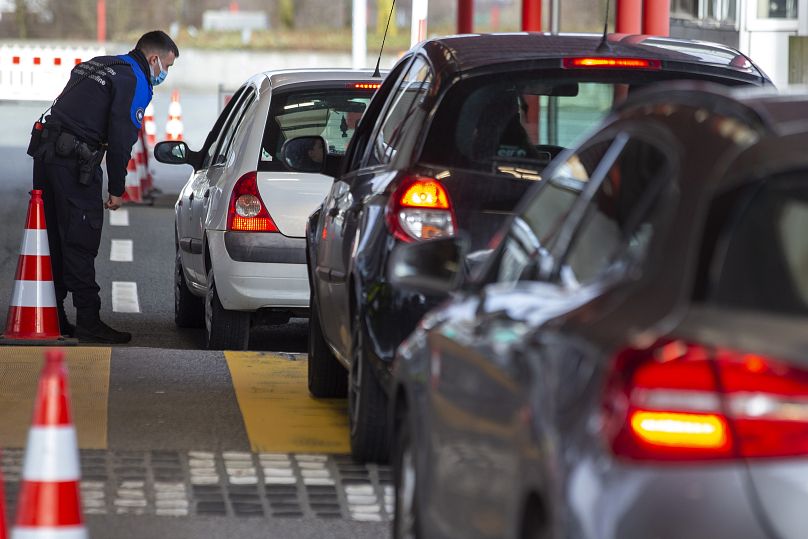
Switzerland has walked out of talks on a closer trading relationship with the European Union despite being offered better terms than the UK in key areas, EU officials have claimed.
Switzerland pulled the plug on the seven-year-long efforts to sign a landmark partnership agreement with the EU, handing a major defeat to the European Commission and risking a deterioration of economic ties.
The decision by the Swiss Federal Council to end talks with Brussels, which had been ongoing since 2014, means that both sides won’t be able to upgrade a patchwork of bilateral treaties covering issues ranging from trade over transport to medical devices — some of which are almost 50 years old.
In statements, Brussels warned that these bilateral deals “will inevitably age,” and threatened that without the broader partnership treaty, “no new agreements with Switzerland will be concluded and the existing agreements may not be updated.”
The Swiss Federal Council ended the talks saying that it could not accept Brussels’ demands on issues like citizen’s rights and wages.
“Taking into account [domestic] consultations and based on the results of negotiations in recent months, the [Swiss] Federal Council has determined that the talks with the EU … have not led to the necessary solutions,” Swiss President Guy Parmelin told reporters in Bern. “The Federal Council has therefore decided to terminate the negotiations on the draft institutional agreement.”
The so-called framework agreement had been negotiated between 2014 and 2018 and was supposed to upgrade EU-Swiss relations — which are currently governed by a patchwork of bilateral treaties — in the areas of seamless travel, mutual recognition of industrial standards, agricultural products, state aid, medical devices, civil aviation and land transport.
The tense reaction indicates that relations with the Alpine state are heading for turbulence. There’s plenty at stake: Switzerland is the EU’s fourth-largest trading partner, while Switzerland trades more with the EU than anyone else.
In the health sector, the Swiss decision will even have an immediate impact. By coincidence, a mutual recognition agreement for medical devices expired on Wednesday, meaning it will be more complicated for manufacturers to trade such devices between the EU and Switzerland. The mutual recognition agreement would have been renewed as part of the partnership treaty, also known as the Institutional Framework Agreement.
Politically, the Swiss rejection of the agreement deals a huge blow to the Commission, which has been heavily investing at the highest level to make the deal work — first under former Commission President Jean-Claude Juncker and then his successor Ursula von der Leyen, who both personally took charge of the file. Juncker said in 2019 that one of the three “biggest regrets” of his tenure was his inability to finalize the deal with Bern.
Brexit had complicated the talks as the Commission’s hard negotiating position toward the U.K. government on issues such as protecting the EU’s single market meant that Brussels did not want to be perceived as being more flexible with the Swiss.
Von der Leyen had been hoping to take a big step toward completing Juncker’s task when she met Swiss President Guy Parmelin last month, but instead, the meeting failed to bridge differences on three key areas in which the Swiss demanded exemptions:
- State aid rules
- EU citizens’ ability to access the Swiss welfare system
- Protection of higher Swiss wages
Swiss politicians argued that without concessions in these areas, the agreement would be at risk of being voted down in a referendum.
The Commission has rejected such exemptions as “simply not acceptable,” arguing that Switzerland’s “privileged access” to the EU market means it must abide by similar rules as the bloc’s member countries: “That is fundamentally a matter of fairness and legal certainty.” An EU factsheet said the bloc had wanted to keep the door open to further negotiations and claimed that Brussels “formulated compromises which go a long way towards the Swiss concerns.”
Our statement on the decision by the Swiss Federal Council to terminate the negotiations of the EU-Swiss Institutional Framework Agreement: https://t.co/FKQzikk0aj pic.twitter.com/mey1B0XTWd
— European Commission ?? (@EU_Commission) May 26, 2021
Yet Parmelin said Wednesday that the Swiss Federal Council had concluded following domestic consultation in recent weeks that “necessary solutions” could not be reached, which is why it “decided to terminate the negotiations.”
Switzerland, a small nation of 8.6 million at the heart of Europe, is surrounded by European Union countries.
While it has chosen to remain outside the 27-nation bloc, it has maintained a close relationship with the EU, which is by far its largest trading partner.
About two-thirds of Swiss imports come from the bloc, while half of the country’s exports go to the EU.
An estimated 1.4 million EU nationals live in Switzerland, while 450,000 Swiss citizens are residents in EU countries.
No fewer than 120 deals between Brussels and Bern were concluded over recent decades, ranging from agriculture to police cooperation.
Why is Switzerland opposed to EU membership?
Well, democracy of course.
The rejection of European integration can be seen as the continuation of the country’s long tradition of neutrality. Under that principle, Switzerland refrained from participating in World War II and in the Cold War, for instance.
Nowadays, however, neutrality is not as prominent as it used to be, Dardanelli told Euronews, and what dominates is a strong attachment to preserving national sovereignty.
Swiss citizens are also concerned that joining the EU would not be compatible with their cherished direct democracy system.
“In Switzerland, you can vote on anything really. You can collect signatures and vote on changing the constitution and any other aspect” of policy-making, Dardanelli explained.
“The Swiss would want to be part of the EU economically but they don’t want to be part of the EU politically,” said Laurent Goetschel, director of the think tank Swisspeace and professor of political science at the University of Basel.
What are the sticking points in the relationship?
Issues surrounding the status of workers in connection with immigration are the main source of tensions between Switzerland and the EU.
The wealthy nation boasts much higher wage levels and social protection than its EU neighbours and is wary of so-called “wage-dumping,” especially when cross-border workers are employed in Switzerland under foreign contracts, Dardanelli explained.
“Switzerland tries to protect the wages and the working conditions of its workforce,” the scholar said including by so-called “flanking measures”.
The Federal Council faced pressure from the economic and financial sectors to save the deal — and demands from opponents to not cave in to the EU.
There have also been calls for the agreement to be put to a referendum, in keeping with the Swiss direct democracy system.
The right-wing, populist Swiss People’s Party (SVP) — the country’s biggest party — called it “a victory for Swiss self-determination” over a “treaty of submission”.
The Socialists lamented the failure of talks, while the Greens called it a “Waterloo” moment.
The main liberal party regretted Bern’s decision but said the EU had “failed to take into account” Switzerland’s interests.
The main employers’ organisations regretted the collapse of talks.
Swissmem, the national association representing the engineering industry, said “unhindered” access to the European market was “decisive” for companies in the sector, which export 55 percent of their production to the EU.
However, the Swiss Trade Union Federation applauded that “the threat to the protection of wages is over”.
Meanwhile, “the EU wants to eliminate those to create a level playing field in terms of competition,” Dardanelli added.

Tensions over the free movement of workers culminated in 2014 with a popular referendum.
“In 2014, an initiative to restrict immigration, which was directly against the agreement with the EU, was put to the vote and was narrowly endorsed,” Dardanelli noted.
The move angered Brussels, even if the measure was never fully implemented.
One of the problems, Dardanelli said, is that “these agreements are divided into packages and that they are linked to each other. So legally, if you denounce one, the other ones also fall.”
A compromise was found to save the face of the government while salvaging cooperation with the EU but that also meant that “what people voted for was not really put into practice,” Dardanelli noted.
The softened text adopted by the Swiss parliament in 2016 gave nationals priority in the jobs market and made it harder for Swiss employers to hire EU citizens.
Taxation and banking secrecy, cornerstones of the powerful Swiss financial system, were long among the flashpoints of the relationship.
But these issues have been addressed through several agreements concluded in recent years. In 2015, Bern and Brussels signed an agreement on the automatic exchange of taxation information. From 2018, Switzerland and each EU member state started automatically exchanging banking data.
Beyond these specific policy areas, what Switzerland wants above all is to maintain its national independence and sovereignty.
“Ideally, the EU would like Switzerland just to adapt itself automatically to the norms and legislations that the EU adopts. Switzerland finds it difficult to do because it feels as it becomes just a vassal state to the EU,” Dardanelli said.
The long-time frictions between Switzerland and the EU again came into play during recent negotiations.
For a long time, the EU pressed Switzerland to go beyond ad hoc cooperation agreements and pushed for an umbrella framework deal, insisting no new bilateral accords could be signed until then. But those talks came to an abrupt halt on Wednesday.
The negotiations essentially stumbled over EU demands for its citizens to have full access to the Swiss labour market. Switzerland resisted such a move, arguing it might result in non-Swiss citizens getting social security rights.
Access of EU firms to the Swiss market was another “hot potato”.
But what dominated was “general scepticism about the framework agreement, which was about the dynamic adaptation of Swiss legislation to legislative developments in the European Union, and also a certain role of the European Court of Justice”. The Swiss “are allergic to what we call foreign judges”, the expert noted.
Ultimately, “the Swiss government came to the conclusion that such a treaty would not have enough chances in a popular referendum”
Support Independent Journalism Today
Our unwavering dedication is to provide you with unbiased news, diverse perspectives, and insightful opinions. We're on a mission to ensure that those in positions of power are held accountable for their actions, but we can't do it alone. Labour Heartlands is primarily funded by me, Paul Knaggs, and by the generous contributions of readers like you. Your donations keep us going and help us uphold the principles of independent journalism. Join us in our quest for truth, transparency, and accountability – donate today and be a part of our mission!
Like everyone else, we're facing challenges, and we need your help to stay online and continue providing crucial journalism. Every contribution, no matter how small, goes a long way in helping us thrive. By becoming one of our donors, you become a vital part of our mission to uncover the truth and uphold the values of democracy.
While we maintain our independence from political affiliations, we stand united against corruption, injustice, and the erosion of free speech, truth, and democracy. We believe in the power of accurate information in a democracy, and we consider facts non-negotiable.
Your support, no matter the amount, can make a significant impact. Together, we can make a difference and continue our journey toward a more informed and just society.
Thank you for supporting Labour Heartlands











